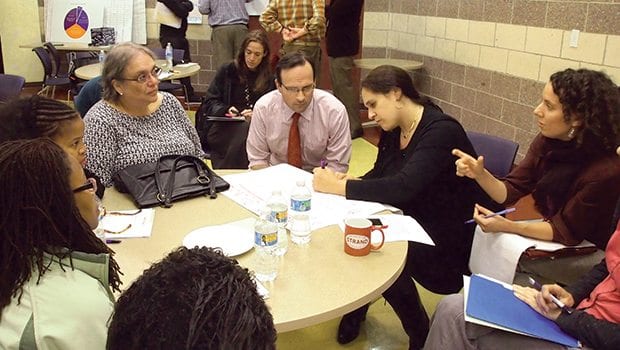
A year ago, members of the Boston Compact, a team of city, charter school and BPS officials, said they would soon release a plan for unified enrollment, a one-stop process through which parents signing their children up for BPS schools would also be added to the charter school application process.
“We’re probably 90-ish percent there in terms of forming a proposal,” said Compact member Turahn Dorsey, the city’s education chief under Mayor Martin Walsh’s administration, in a January interview. “The intent is that when we get an updated proposal, we’ll vet it publicly.”
The plan, if there was one, was never released, a development a national education reform group chalks up to the bitter fallout from the 2016 Ballot Question 2 battle over charter school expansion in Massachusetts.
“… [T]he heated rhetoric over the ballot initiative — which focused on how increased charter school enrollments would impact school districts around the state — dealt a fatal blow to the work in Boston,” reads a January 2018 report from the Center on Reinventing Public Education (CRPE), a Washington-based education reform think tank funded by corporate philanthropists including the Gates and Walton foundations. “The failure of these efforts to unify enrollment across charter and district schools reveals that while the road to district-charter collaboration may be paved with good intentions, such initiatives live and die under the pressure of politics.”
The politics of ed reform
The CRPE report cites “unfavorable community and board politics” as an inhibiting factor in district-charter collaboration.
“In big city school districts, community politics is a constant constraint on what is possible,” the report reads.
Unlike many other U.S. cities, district school leaders in Boston have been vocally supportive of the cross-sector collaboration promoted by the Boston Compact. Education Chief Dorsey and BPS officials sit on the compact’s board and attend the body’s regular meetings.
In Boston, the political factors influencing parents’ view of cross-sector collaboration between district and charter schools may have been influenced by moves made by city officials and out-of-state charter advocates who contributed more than $20 million to Ballot Question 2, which would have lifted the statewide cap on charter school expansion.
The idea of unified enrollment was first floated in 2015 during a series of community meetings. Many parents met the plan with skepticism, questioning whether it was a backdoor attempt to expand charters at the expense of district schools. Indeed, documents from CRPE advocated closing schools labeled “under-performing” and replacing them with “high-performing” charter schools.
The unified enrollment proposal, backed by Dorsey, came after the mayor met with members of the parent advocacy group Quality Education for Every Student (QUEST) and reportedly suggested the district should close as many as 36 of the its 126 schools. Walsh repeatedly denied making the statement, which was reported by numerous members of the parent group.
The push for unified enrollment also came after the Dec. 2015 release of a widely discredited draft report by McKinsey & Company calling for the closure of 20 to 50 BPS school buildings as a cost-saving measure for the school system.
As much as the district’s moves have angered parents, Ballot Question 2 seemed to stoke parents’ concerns about charters even more, with 62 percent of Bostonians voting down the measure. The CRPE report cites cities where elected school committees and strong city councils provide a counter-balance to mayoral authority as examples of instances where politics derailed cross-sector collaborations. But in Boston, Walsh appoints the School Committee and the City Council has limited power to block his policies. The “politics” that appears to have undermined support for unified enrollment in Boston was the politics of Question 2, not an internecine squabble in City Hall. Support for charters in Boston, and throughout Massachusetts, declined steadily throughout 2016, even as charter supporters pumped more than $21 million into marketing the charter expansion measure.
CRPE recommends
The CRPE report advocates that groups like the Boston Compact broaden their political base by building coalitions with nonprofits and other stakeholders and focus on “baby steps,” small collaborations that build trust between the charter and district school sectors.
The organization cites Denver, Colorado, where leaders from charter and district schools worked to win over middle class families, “closing fewer schools, focusing new charter schools on underserved neighborhoods that did not threaten existing power bases, and leaving key middle class advantages (e.g., neighborhood schools in affluent areas) alone.”
CRPE, housed at the University of Washington, advocates for school reforms including what it calls the “portfolio strategy,” a model where district, charter and private schools work together to provide a network of choices for parents. Boston joined CRPE’s Portfolio Network in 2011 and since then, the think tank notes, has been an exemplar in implementing school autonomy — one of the seven components of its portfolio strategy. Other components include performance-based accountability for schools, pupil-based funding for all schools and “good options and choices for families.”
CRPE regularly interviews leaders in school districts, charter schools, and support organizations in cities that have formalized their partnerships through District-Charter Collaboration Compacts supported by the Bill & Melinda Gates Foundation, according to the CRPE website.







